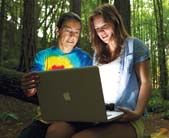Any way you slice it
A UVic team pioneers the next step in the ever-evolving information age

student/lab volunteer
Georgia Gibbs in UVic's
Mystic Vale.
PHOTO: NIK WEST
by Peigi McGillivray
The advent of the Internet has had a revolutionary impact on our lives. We use the web not only to look up information, but also to communicate with each other, to work, shop, entertain ourselves, study and share our daily lives in ways that were impossible a few decades ago. It's hard to imagine what more a computer network could do.
Well, fasten your seatbelts. According to University of Victoria computer scientist Yvonne Coady, we're on the threshold of a technological change that promises to be every bit as revolutionary as the World Wide Web.
"The next step," says Coady, "is to tap into the computing power of networked computers—not just the information they hold—to create virtual supercomputers capable of analyzing massive amounts of data, such as climate models, satellite images and DNA sequences."
Coady and her team of faculty and graduate student researchers are Canadian leaders in a global project called "Slice Around the World" which demonstrates the potential of this cutting-edge technology. Using "slices" from programmable research networks around the globe, they're linking up clusters of computers that communicate through networks thousands of times faster than the Internet.
The project uses BCNET, British Columbia's advanced computer network, and CANARIE, Canada's national ultra high-speed network, to connect with research partners.
"The uses for this kind of dynamic, programmable networking are almost limitless," says Coady. "The exciting thing is that it will be revolutionary not just for scientists, many of whom already have access to this kind of network, but for everyone in the community. It will break down the ivory towers of research and put enormous computing power into the hands of ordinary people."
Let's say you want to know how BC's forests have changed over the past 20 years. If you do a Google search today, you'd find hundreds of thousands of pages of information—of which only a small percentage would be accurate or relevant. Sorting the good information from the irrelevant, biased or faulty would take you a very long time.
The networks Coady and her team are developing will do the sorting and analyzing for you almost instantly, weeding out inappropriate information and producing a factual answer that takes all available data into account—everything from scientific studies and government reports to forest industry white papers, satellite images, and historical and current photos.
"This project shows that the infrastructure works," says Coady, "and that UVic is among the frontrunners in its development. One day soon, we'll all be using networks like this."
Eventually, what will be needed, she says, is a lot more data. That's something that everyone will be able to help with. For example, your photos of the West Coast Trail could help advance tsunami research or document the effects of climate change. "We also need more people who know how to ask questions and communicate effectively with this revolutionary new kind of computer network," says Coady. "A little programming knowledge will go a long way in solving the big problems our world is facing."
View as PDF (620K).
Floating new ideas—to the marketplace
A hallmark of UVic's research activity has always been the commitment to sharing new ideas and innovations for the benefit of society. That includes saving lives.
In the early 1970s, few appreciated how deadly and common hypothermia can be, and few scientists had explored solutions. In 1977, research by a team led by UVic thermal biologist John Hayward led to the development of the Mustang Thermofloat jacket, now made in Vancouver and distributed throughout North America.
Early successes like this led the university to create UVic IP, which helps researchers, students and industry partners move innovations from the lab to the marketplace. UVic IP serves as a portal for private sector collaboration and as a launch pad for viable inventions and ideas.
Annually, UVic IP negotiates hundreds of industry contracts, files dozens of patents, and actively promotes the transfer and application of university knowledge—right from the first spark of an idea.
Info: web.uvic.ca/industry
